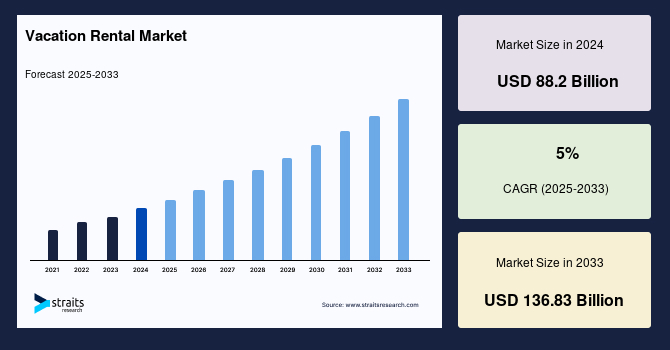The Growing Landscape of the Vacation Rental Market
Overview of the Vacation Rental Market Size
The global vacation rental market was valued at USD 88.2 billion in 2024, with projections indicating growth to USD 136.83 billion by 2033, marking a Compound Annual Growth Rate (CAGR) of 5% from 2025 to 2033.
Factors Driving Growth
Several factors are contributing to the robust expansion of this market:
- Evolving Traveler Preferences: More travelers are seeking unique, home-like accommodations that provide privacy and flexibility.
- Technological Advancements: Platforms like Airbnb, Vrbo, and Booking.com have transformed how bookings are made, offering user-friendly interfaces and advanced features.
- Rise of Remote Work: The blending of work and leisure travel, often referred to as workcations, has escalated the demand for vacation rentals.
The increasing disposable income among the developing middle class has broadened the market’s customer base. Yet, regulatory hurdles and concerns about housing affordability present challenges that must be navigated for the market to continue its upward trajectory.
Market Trends
Luxury and Experiential Stays on the Rise
Today’s travelers are shifting towards luxury and experiential stays. They seek accommodations that offer more than just a place to sleep, prioritizing:
- Curated Experiences
- High-end Amenities
- Personalized Services
This trend is exemplified by Airbnb’s expansion into its “Airbnb Luxe” and “Airbnb Experiences” categories. For instance, May 2024 saw the introduction of the “Icons” collection, featuring exclusive listings tied to celebrities and iconic destinations such as Barbie’s Malibu DreamHouse.
Moreover, technology plays a key role in this evolution. With AI-driven concierge apps, travelers can receive personalized itineraries and local recommendations, enhancing the overall vacation experience.
Key Market Drivers
Technological Advancements
Technological innovations are at the forefront of accelerating the vacation rental market.
- Smart Home Technologies: Keyless entry systems and smart thermostats are revolutionizing guest comfort and security.
- AI-Powered Services: Platforms like Airbnb are launching AI tools that enhance guest experiences with tailored recommendations.
Market Restraints
Regulatory Challenges
Despite the significant growth potential, the market is contending with regulatory challenges. Governments worldwide are instituting stricter regulations aimed at addressing:
- Rising housing costs
- Noise complaints
- Overtourism impacts
Examples include Spain’s removal of over 65,000 illegal listings in popular tourist destinations, highlighting the lack of uniform regulations across regions, which complicates operations for global providers.
Opportunities for Growth
Expansion into Emerging Markets
Emerging markets are ripe for opportunity, with increased travel accessibility and rising incomes. For example, Airbnb’s recent features aimed at markets in cities like San Antonio and Austin demonstrate the potential to tap into local cultures and experiences.
Regional Analysis
Europe
Europe commands a 34% share of the global vacation rental market, driven by its rich cultural and geographical diversity. Popular destinations such as France, Italy, and Spain attract tourists seeking unique experiences. The regulatory landscape promotes quality standards, while eco-conscious travel options are becoming increasingly popular.
North America
North America holds the title of the fastest-growing region, with a notable surge in “bleisure” travel—a blend of business and leisure—which demands vacation rentals equipped with modern amenities suited for remote work.
Asia-Pacific
The Asia-Pacific region is projected to grow at a CAGR of 4.9% through 2030, driven by increased regional tourism and rising middle-class incomes. Countries like China and India are significant contributors, with rapid technological adoption simplifying the rental process.
Accommodation Type Insights
Homes dominate the market, appealing to families and groups seeking affordability and privacy. They typically offer features such as:
- Full kitchens
- Multiple bedrooms
- Private amenities
Booking Mode Insights
Online bookings have become the predominant method in the vacation rental market. The reliance on platforms like Vrbo and Booking.com has been heightened by:
- Digital adoption
- Mobile penetration
- Consumer demand for convenience
End-User Insights
Leisure travelers—comprising families, couples, and groups—make up the largest segment. They prefer accommodations that reflect local culture and offer immersive experiences, shaping the vacation rental landscape.
Recent Developments
Key Players
Major players in the vacation rental market include:
- Airbnb
- Vrbo
- Expedia Group
- OYO Rooms
These companies leverage technological innovation and local partnerships to enhance user experience.
Conclusion
The vacation rental market is poised for continued growth, driven by evolving traveler preferences, technological advancements, and opportunities in emerging markets. As the landscape evolves, addressing regulatory challenges will be crucial for sustaining momentum.
For further insights, explore platforms like Booking.com and TripAdvisor Rentals to discover the latest trends and offerings in the vacation rental market.


